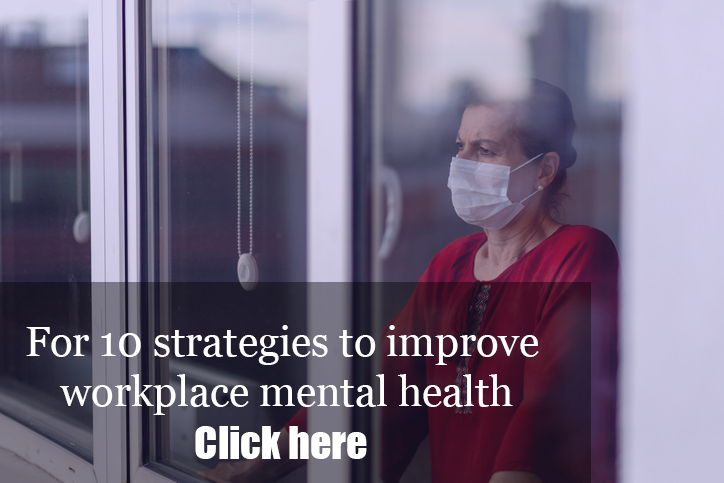After a grueling year of COVID-19–and its damaging effect on workers’ collective emotional state–there is some positive news on the mental health front.
Some indicators of employees’ mental health are measuring equal to or better than before the pandemic, according to new research from Total Brain’s Mental Health Index. But experts warn there was a mental health crisis even before the virus hit the United States, and employers must remain attentive and responsive to workers’ behavioral needs to continue to ebb the tide.
“A year into the pandemic, there is clearly hope at the end of the tunnel,” says Michael Thompson, president and CEO of the National Alliance of Healthcare Purchaser Coalitions. “Employers’ focus on empathetic management and setting rational expectations related to managing the virus is helping to mitigate the mental distress of working through this era.”
The most recent figures from Total Brain’s Mental Health Index show some promising news when comparing February 2021 to February 2020. The risk of addiction for women is down 39%, for instance, while social connectivity is up 3%. The mental health index, in partnership with the National Alliance of Healthcare Purchaser Coalitions, One Mind at Work, and the HR Policy Association and its American Health Policy Institute, is based on 500 anonymized assessments randomly selected among thousands of Total Brain assessments taken each week.
Register for HRE’s upcoming virtual benefits conference.
The rollout of the COVID-19 vaccines, plus heightened efforts by employers–including the rollout or enhancement of mental health programs, apps and other programs–are helping to offer some hopefulness, experts say.
However, not all data is positive from Total Brain’s latest mental health index. Sustained attention is down 33% and the risk of general anxiety is up 30% from a year ago. Overall, the last year has seen soaring rates of stress, depression, anxiety and burnout. Plus, employers already had a mental health epidemic on their hands even before the COVID-19 pandemic, experts say.
 “Now is not the time for employers to pull back on mental health investments,” warns Total Brain CEO Louis Gagnon. “A mental health crisis existed long before COVID-19. Data prior to the pandemic revealed a stunning 70% of U.S. workers’ brain capacity is impaired to some degree by stress and high-risk of mental health conditions–a reminder that the pandemic only amplified an existing crisis that is still left to be addressed.”
“Now is not the time for employers to pull back on mental health investments,” warns Total Brain CEO Louis Gagnon. “A mental health crisis existed long before COVID-19. Data prior to the pandemic revealed a stunning 70% of U.S. workers’ brain capacity is impaired to some degree by stress and high-risk of mental health conditions–a reminder that the pandemic only amplified an existing crisis that is still left to be addressed.”
Podcast: COVID-19’s impact on workplace mental health
Meanwhile, data from Limeade recently found that employee burnout is soaring as a result of COVID-19. When the software company surveyed employees just months before the pandemic began, they found that 42% of workers were burned out. When they asked employees about burnout again, a few months into COVID-19, that number had shot up to 72%. “Almost half of our employees being burned out is already very concerning. But at that second point in time, we see almost three-quarters of employees reporting that they are burnt out. That is–I don’t have enough red flags to raise,” Lindsay Lagreid, senior advisor at Limeade’s Limeade Institute, said recently during the company’s virtual conference. “That’s very, very concerning. This is human suffering, this is substance abuse, this is stress impacting our physical health. This is people’s wellbeing suffering.”
Related: 10 strategies to improve employee mental health
Garen Staglin, chairman of One Mind at Work, cautions that although it’s good to see any positive trends from the monthly index, “we should be very clear that anxiety, depression and PTSD are, and will remain, at elevated levels.”
“Much like the warnings from the CDC on the virus, these conditions need our focus and innovative treatments,” he says. “They will also long outlive the pandemic and there is no vaccine for them.”

